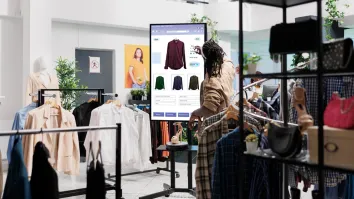
Turning to a ‘mobile point of service’ vital for retailers
Sales staff should not be left behind when transforming their operations.
Providing a seamless shopping journey to consumers remains crucial for business operations. However, shops should no longer serve as a point of sale, but rather as a “mobile point of service.”
Marco Lim, Commercial Director APAC, Cegid, said providing a seamless omnichannel experience is about “meeting the customers where they are.”
“[F]ocus on how to turn your point of sale into a point of service, for example, to manage appointments or bookings,” he said in a panel discussion at the Retail Asia Summit.
This would also entail equipping their sales staff with mobile solutions that will help them acquire and view 360-degree customer data. The mobile POS should also be able to check inventory stock in real-time.
“Often, we have to wait whilst the staff is going in the back room to check whether they have stock or not. That is frustrating. In today’s world, this should not happen anymore,” Lim said.
Brands should never forget their staff when improving store operations, noting that they are the ones facing the customers.
“Talent retention is extremely important. Retailers can and should use technology to help the staff in their day-to-day job beyond just transactions.,” he said.
“Equipping the staff with the right technology, the right mobile technology, whether it be helping the transactions, or helping with a day-to-day job, should be really on the top priority list for many retailers today,” he added.
Seamless experience
JJ Eastwood, SVP of Brand Solutions at Carousell Group said consumers still expect the best customer experience in e-commerce even if the platform serves as a secondhand marketplace.
Selling online is a complicated process as retailers would not only need to create a product listing but are also engaged in the whole process, including speaking with customers.
In the marketplace, Eastwood said they allow sellers to sell the products directly to Carousell, and in turn, they certify the authenticity of the products, provide warranty, and post them just like in traditional e-commerce.
“There’s a buy button rather than a chat and there’s a transparency around the [products’ authenticity],” he said, noting that personalisation and sustainability are vital in the resale market that is growing 16 times faster than the traditional retail market.
Camille Barthe, General Manager and Head of Marketing, Maison 21G, said providing a seamless omnichannel experience to customers is one of the key challenges they have to face.
In its boutique, Maison 21G places a QR Code which they can use to direct the customers to a questionnaire which will help know the customers’ preferences.
Despite this, there is a need for brands to provide a human touch to customers and have humans at the receiving end of a line that can entertain questions instead of just a chatbot.
In-store, meanwhile, Maison 21G offers its customers a masterclass workshop offering private lessons about perfume and developing their fragrance is one of their strategies to stand out.
“It’s super important for us to have this experience because it provides and develops the loyalty of our customers,” she said.
Sustainable practices
Sustainability and ethical practices have also been a vital component in a business operation, particularly for Zalora, Achint Setia, Chief Revenue and Marketing Officer, ZALORA, said, noting that fashion is a big contributor to global greenhouse emissions.
Zalora, which targets to be carbon neutral, has been able to cut its carbon footprint by a third, anchored on three pillars, Setia said.
First is fair and ethical sourcing which ensures the sustainability of the kinds of materials used. The second is around climate action or reducing greenhouse gas emissions, and the last is circular fashion.
Setia noted that around 9% to 10% of its revenue comes from quality sustainable products.
For Maison 21G, it is much easier to balance profitability and sustainability for startup companies like themselves as they have started with a sustainable business already across its supply chain from its suppliers, ensuring natural ingredients, down to the packaging components.
In expanding in Asia, Maison 21G also established a factory warehouse in Singapore to minimise its carbon footprint. The company also introduced a refillable model to encourage people to recycle.
Setia also noted that sustainable products are sometimes more affordable, but there are also times when they have to pass the cost on to the consumers. But since the pandemic, consumers are more concerned about the “value for money” when purchasing.
“The business model has to crack the right price point, and then the consumers will be willing to take that on,” he said.
The rise of AI
Generative artificial intelligence (AI) will remain the “game changer” for retailers, even if the technology is still nascent, Setia said.
This technology will help retailers predict consumer behaviour, and assist them in managing their inventory and demand management, noting its importance given the unpredictability of customer shopping behaviour.
AI will also be essential in enhancing customer experience as they can serve as guides, not only as chatbots, in the consumers’ shopping journey.
At Cegid, Lim said that they are integrating AI in all its solutions and are creating a team of 300 developers specialising in AI to help retailers and customers optimise their operations and generate more sales.

















 Advertise
Advertise








